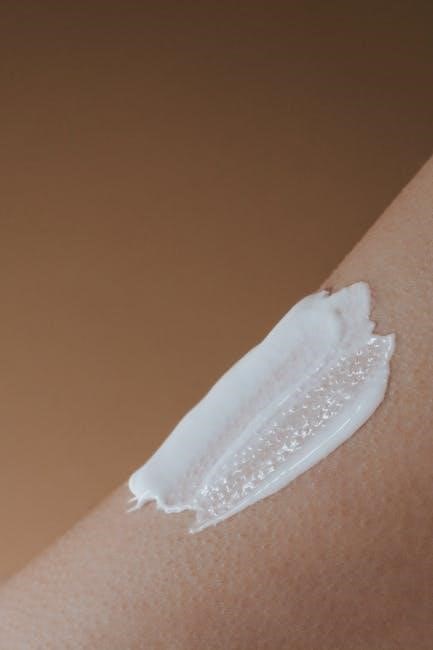Dorothea Orem’s Self-Care Theory‚ a grand nursing theory‚ emphasizes individuals’ abilities to perform self-care activities essential for well-being. It provides a framework for nurses to assess and address self-care deficits‚ promoting health and preventing illness. Widely applied in nursing practice‚ Orem’s theory is foundational‚ guiding nurses in supporting patients’ autonomy and health management.
1.1 Overview of the Self-Care Deficit Theory
The Self-Care Deficit Theory‚ developed by Dorothea Orem‚ explains how individuals’ inability to meet their self-care needs results in health deficits. It identifies three types of self-care requisites: universal (e.g.‚ nutrition‚ safety)‚ developmental (e.g.‚ maturation)‚ and health deviation (e.g.‚ illness management). The theory emphasizes nursing interventions to address these deficits‚ ensuring patients achieve optimal health outcomes. It provides a structured framework for nurses to assess‚ plan‚ and implement care tailored to individual needs.
1.2 Importance of Self-Care in Nursing Practice
Self-care is fundamental in nursing practice as it empowers patients to manage their health‚ enhancing autonomy and well-being. Nurses play a crucial role in educating patients about essential self-care activities‚ such as nutrition‚ hygiene‚ and medication management. By fostering self-care‚ nurses promote health maintenance‚ prevent complications‚ and improve quality of life. This approach reduces reliance on healthcare systems and enables individuals to take an active role in their health‚ aligning with holistic and patient-centered care principles.

Origin and Development of the Self-Care Theory
Dorothea Orem’s Self-Care Theory emerged from her extensive nursing experience and collaborative efforts with scholars over four decades‚ refining her ideas into a comprehensive framework.
2.1 Dorothea Orem’s Background and Contributions
Dorothea Orem‚ a renowned nursing theorist‚ developed the Self-Care Deficit Theory‚ revolutionizing nursing practice. Holding degrees in nursing and education‚ she dedicated her career to advancing nursing science. Her contributions include the concept of self-care requisites and therapeutic self-care demands‚ providing a structured approach for nurses to support patients’ health management. Orem’s work has been widely recognized and applied across various healthcare settings‚ making her one of the most influential figures in nursing theory.
2.2 Evolution of the Theory Over Four Decades
Dorothea Orem’s Self-Care Theory evolved over four decades‚ beginning in the 1950s and refining through the 1990s. Initially focused on self-care deficits‚ the theory expanded to include therapeutic self-care demands and nursing interventions. Collaborations with practitioners and scholars enriched its scope‚ making it applicable across diverse healthcare settings. The theory’s adaptability to changing healthcare needs solidified its relevance‚ influencing nursing education‚ research‚ and practice globally. Its enduring impact underscores Orem’s visionary contribution to nursing science and patient care.

Core Concepts of the Self-Care Theory

Dorothea Orem’s Self-Care Theory emphasizes self-care activities essential for well-being. Core concepts include self-care requisites‚ basic conditioning factors‚ and therapeutic self-care demands‚ guiding nursing interventions to address deficits and promote health.
3.1 Basic Conditioning Factors and Self-Care Requisites
Basic Conditioning Factors (BCFs) are variables influencing individuals’ self-care abilities‚ such as age‚ health‚ and resources. Self-Care Requisites (SCRs) are universal‚ developmental‚ and health deviation needs; Universal requisites address daily living activities‚ while developmental and health deviation requisites focus on growth and managing health conditions. Nurses use BCFs and SCRs to assess patients’ self-care deficits and design interventions that promote autonomy‚ ensuring comprehensive care tailored to individual needs and enhancing overall well-being.
3.2 Therapeutic Self-Care Demands and Nursing Intervention
Therapeutic self-care demands are actions individuals must perform to maintain health and well-being when their abilities are compromised. Nursing intervention focuses on helping patients meet these demands‚ either by teaching self-care skills or providing direct care. Nurses assess patients’ capabilities and deficits‚ then implement strategies to enhance independence and reduce health risks. Interventions may include education‚ support‚ or supplementary care‚ ensuring patients can manage their needs effectively and achieve optimal health outcomes.
Application of the Self-Care Theory in Nursing Practice
Orem’s Self-Care Theory is widely applied in diverse healthcare settings‚ guiding nurses to prioritize patient care. It aids in assessing self-care needs and implementing interventions to enhance health outcomes.
4.1 Use of the Theory in Various Healthcare Settings
Orem’s Self-Care Theory is applied across diverse healthcare settings‚ including acute care‚ rehabilitation‚ and community health. In acute care‚ it helps nurses prioritize patient needs‚ while in rehabilitation‚ it supports patients in regaining independence. Home healthcare utilizes the theory to empower patients and families to manage chronic conditions. Additionally‚ public health settings apply the theory to promote self-care practices within communities‚ addressing health education and disease prevention. The theory’s versatility makes it a cornerstone in tailoring care to individual and population needs.
4.2 Case Studies and Practical Examples
Case studies demonstrate Orem’s theory in action‚ such as managing chronic conditions. For instance‚ a patient with hypertension used self-care strategies to monitor blood pressure‚ resulting in improved health outcomes. Similarly‚ a diabetic patient applied self-care practices to manage blood glucose levels effectively. Practical examples include orthopedic patients performing exercises to regain mobility and elderly individuals using self-care to maintain independence. These examples highlight the theory’s practical application in fostering patient autonomy and health promotion across diverse clinical scenarios.
Evaluation and Critique of the Self-Care Theory

Orem’s theory offers a clear framework for nursing practice‚ emphasizing patient autonomy and self-care. However‚ critics argue it lacks cultural sensitivity and situational adaptability‚ limiting its universal application.
5.1 Strengths and Limitations of the Theory
Orem’s Self-Care Theory is a grand nursing theory providing a clear framework for understanding self-care needs‚ emphasizing patient autonomy and health promotion. Its strengths include wide applicability across diverse healthcare settings and its focus on empowering patients. However‚ limitations arise from its lack of cultural adaptability and limited consideration of situational factors. Additionally‚ the theory does not fully address the emotional and psychological aspects of self-care‚ potentially narrowing its scope in holistic care.
5.2 Comparison with Other Nursing Theories
Orem’s Self-Care Theory shares similarities with other nursing theories in its patient-centered approach but differs in its specific focus on self-care activities. Unlike Maslow’s Hierarchy‚ which prioritizes basic needs‚ Orem’s theory emphasizes autonomous actions for health. Compared to Pender’s Health Promotion Model‚ which focuses on behavioral factors‚ Orem’s framework is more structured‚ providing clear guidelines for nursing interventions. While Watson’s Theory of Human Caring highlights the nurse-patient relationship‚ Orem’s theory is distinctive in its emphasis on patients’ self-care capabilities and deficits.
Future Directions and Relevance in Modern Nursing
Orem’s theory remains relevant in modern nursing through integration with technology‚ personalized care approaches‚ and global health applications‚ ensuring patient autonomy and holistic well-being.
6.1 Integration of Self-Care Principles into Contemporary Practice
Orem’s self-care principles are increasingly integrated into modern nursing through technology-enhanced interventions and personalized care plans. Telehealth platforms now support remote self-care education‚ empowering patients to manage chronic conditions. Additionally‚ the theory aligns with current healthcare trends‚ such as preventive care and patient-centered approaches; Nurses use Orem’s framework to design tailored interventions‚ addressing individual needs and promoting autonomy. This integration ensures the theory remains relevant‚ adapting to evolving healthcare demands while maintaining its core focus on patient self-care agency and holistic well-being.
6.2 Role of Technology in Enhancing Self-Care Interventions

Technology significantly enhances self-care interventions by providing innovative tools that support Orem’s principles. Mobile apps and wearable devices enable patients to monitor and manage their health‚ while telehealth platforms facilitate remote guidance from nurses. These tools promote adherence to self-care practices and improve health outcomes. Technology also aids in personalized care plans‚ making interventions more accessible and engaging. By leveraging technology‚ nurses can empower patients to take an active role in their self-care‚ aligning with Orem’s emphasis on patient autonomy and holistic well-being.

Educational and Research Implications
Orem’s Self-Care Theory is integral to nursing education‚ guiding curriculum development and research. It inspires studies on self-care interventions‚ enhancing evidence-based practice and patient outcomes globally.

7.1 Teaching Self-Care Theory in Nursing Education
Dorothea Orem’s Self-Care Theory is a cornerstone in nursing education‚ providing a framework for teaching students to assess and address patients’ self-care needs. It emphasizes the importance of promoting autonomy and health management. Educational programs integrate Orem’s principles into curriculum design‚ enabling future nurses to apply theoretical knowledge in clinical settings. This fosters critical thinking and skill development‚ preparing students to address diverse patient populations. The theory also encourages research opportunities‚ advancing evidence-based practice and enriching nursing education globally.
7.2 Research Opportunities and Gaps in Current Literature

Research on Dorothea Orem’s Self-Care Theory highlights its application across diverse healthcare settings‚ yet gaps remain in exploring its efficacy for chronic illnesses and mental health. Studies often focus on physical conditions‚ leaving psychological self-care underexplored. Additionally‚ the integration of technology to enhance self-care interventions requires further investigation. There is a need for longitudinal studies to assess long-term outcomes and comparative research to evaluate its effectiveness against other nursing theories. Addressing these gaps could deepen the theory’s relevance and application in modern nursing practice.

Dorothea Orem’s Self-Care Theory revolutionized nursing by emphasizing self-care’s role in health. It provides a framework for nurses to support patients‚ fostering autonomy and well-being.
8.1 Summary of Key Points
Dorothea Orem’s Self-Care Theory is a foundational framework in nursing that emphasizes individuals’ abilities to perform self-care activities essential for health and well-being. The theory outlines basic conditioning factors‚ self-care requisites‚ and therapeutic self-care demands‚ guiding nurses in addressing deficits. It promotes patient autonomy‚ empowerment‚ and health management. Orem’s work has been widely applied in various healthcare settings‚ influencing nursing education‚ research‚ and practice. Its relevance endures‚ shaping modern nursing’s focus on holistic‚ patient-centered care and the integration of self-care principles into contemporary interventions.
8.2 Final Thoughts on the Impact of Orem’s Theory
Dorothea Orem’s Self-Care Theory has profoundly shaped nursing practice‚ education‚ and research. Its emphasis on patient autonomy and self-care empowerment remains central to contemporary nursing. The theory’s adaptability across diverse healthcare settings underscores its enduring relevance. By fostering a holistic‚ patient-centered approach‚ Orem’s work continues to inspire future generations of nurses‚ ensuring its legacy as a cornerstone of nursing science and practice.
